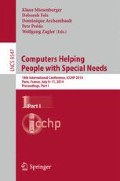Abstract
Special needs of intellectually and mentally challenged people are generally not considered in ICT, not even in exemplary accessible websites. In this paper we reveal our scientific approach on how to develop guidelines closing this gap. We describe the process of extracting relevant and easy-to-understand directives from scientific literature addressing different aspects of user interfaces and different cognitive abilities. Considerations on how to further develop and improve these beta guidelines and on how to implement the gained insights in the World Wide Web are discussed.
Access this chapter
Tax calculation will be finalised at checkout
Purchases are for personal use only
Preview
Unable to display preview. Download preview PDF.
References
Berger, A., et al.: Web 2.0/barrierefrei. Eine Studie zur Nutzung von Web 2.0 An-wendungen durch Menschen mit Behinderung, http://publikationen.aktion-mensch.de/barrierefrei/Studie_Web_2.0.pdf
Bohman, P.R.: Web Accessibility for Cognitive and Learning Disabilities: A Review of Research-Based Evidence in the Literature (2007), http://www.digitalaccessibility.org/accessibility/cognitive/litreview2007
Einfach für alle, Das Angebot der Aktion Mensch für ein barrierefreies Internet – Web Content Accessibility Guidelines (2011), http://www.einfach-fuer-alle.de/wcag2.0
Ellies, K., Kent, M.: Disability and New Media. Routledge, New York (2011)
Karreman, J., Van der Geest, T., Buursink, E.: Accessible Website Content Guidelines for Users with Intellectual Disabilities. Journal of Applied Research in Intellectual Disabilities 20, 510–518 (2007)
Kelly, B., et al.: Accessibility 2.0: Next Steps for Web Accessibility. Journal of Access Services 6(1-2), 265–294 (2009)
Matausch, K., Peböck, B., Pühretmair, F.: Accessible Content Generation an Integral Part of Accessible Web Design. Procedia Computer Science 14, 274–282 (2012)
Murphy, J., Cameron, L.: The effectiveness of Talking Mats with people with intellectual disabilities. British Journal of Learning Disabilities 36(4), 232–241 (2008)
Author information
Authors and Affiliations
Editor information
Editors and Affiliations
Rights and permissions
Copyright information
© 2014 Springer International Publishing Switzerland
About this paper
Cite this paper
Antener, G., Bolfing, A., Calabrese, S. (2014). Easy to Surf - What Makes Websites Accessible to People with Intellectual and Learning Disabilities. In: Miesenberger, K., Fels, D., Archambault, D., Peňáz, P., Zagler, W. (eds) Computers Helping People with Special Needs. ICCHP 2014. Lecture Notes in Computer Science, vol 8547. Springer, Cham. https://doi.org/10.1007/978-3-319-08596-8_24
Download citation
DOI: https://doi.org/10.1007/978-3-319-08596-8_24
Publisher Name: Springer, Cham
Print ISBN: 978-3-319-08595-1
Online ISBN: 978-3-319-08596-8
eBook Packages: Computer ScienceComputer Science (R0)

